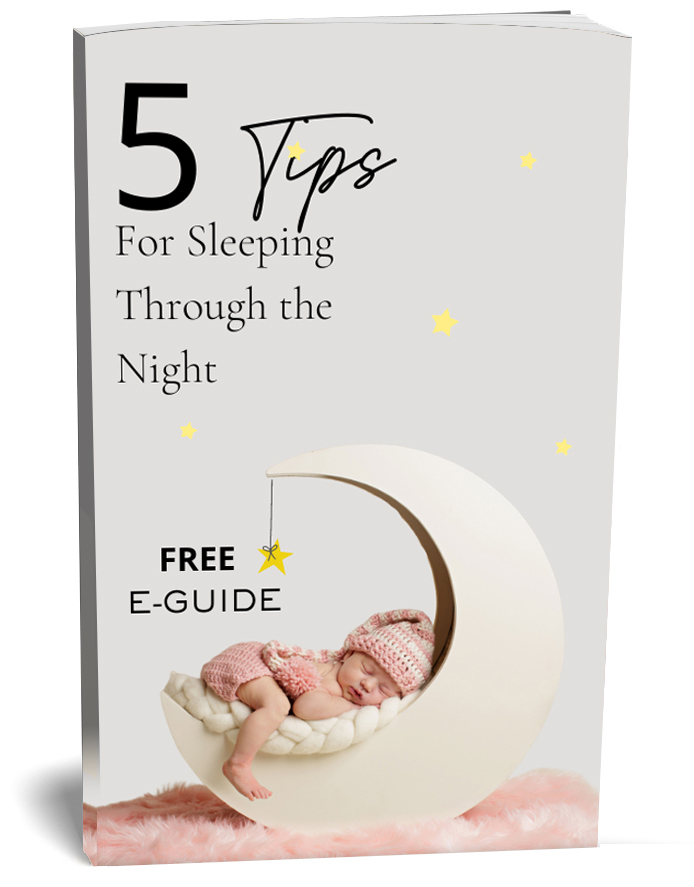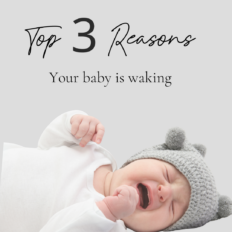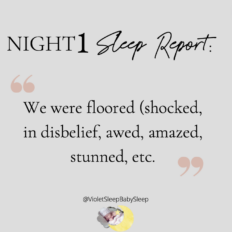
What You Need to Know About Sleep Regression
Your baby was sleeping well and awakening well-rested and ready to go. Suddenly, she’s having trouble falling asleep, waking at night, and she may be fighting naps, too. What’s going on?
If your former super-sleeper is suddenly wakeful at all the wrong times, your baby may be going through a sleep regression.
HOW TO KNOW IF IT’S A SLEEP REGRESSION
A sleep regression is when your baby had previously established healthy sleep/wake patterns, but now those patterns are disturbed.
The changes may be minimal –– for instance, your infant might start waking once at night –– or the disturbances can be all over the place. (For example, he naps beautifully one day but won’t go to sleep that night; the next day he takes only one nap instead of two, etc.).
Sleep regressions can happen to your baby at any time, but they are most common at about four months, nine months, and twelve months of age.
WHAT A TYPICAL BABY SLEEP REGRESSION LOOKS LIKE
If your baby is going through a sleep regression, she may experience the following:
- Your baby goes from sleeping through the night to suddenly waking several times a night.
- She can’t fall asleep or stay asleep.
- She fights naps, bedtime, and wakes frequently at night, often crying.
- Your baby is clingy, cranky and overly needy during the day.
- You have ruled out illness, teething or a growth spurt, and your baby’s sleep issues have lasted longer than a few days.
WHY YOUR BABY GOES THROUGH SLEEP REGRESSION
As I mentioned above, your baby’s sleep regression episodes can happen at any time, but are most common at:
- Four months
- Nine months
- Twelve months
There’s a very good reason for this timetable. Each of these periods is a time that your baby is attempting to achieve major milestones, including rolling, sitting, standing, crawling, walking, and Baby’s very first words.
Actually, what’s happening with your baby is pretty interesting. He is going through tremendous development both physically and cognitively. During the day, that’s fine; you’re likely giving him plenty of tummy time, standing practice, and you’re reading to him to keep those mental
gears moving and developing.
Unfortunately, when you put your baby down to sleep, he continues to be stimulated by the instinct to practice, practice, practice. So naturally, it can be difficult for him to sleep.
YOUR BABY’S BRAIN IS IN OVERDRIVE
Try to imagine for a minute what you feel like the night before a big event like going away on a vacation, or the night before your wedding.
You stay up all night thinking about everything, making sure you don’t forget anything. You toss, turn and keep looking at the clock. No matter what you do, you can’t seem to turn off your thoughts. Frustration kicks in, making things all the harder. Don’t you just want to scream?
It’s even worse the next day. You’re overtired, cranky and you wish you could just crawl back into bed.
This is exactly what’s going on with your baby. She tries to soothe herself to sleep like she always did before, but just like you, she can’t turn off her brain. So she calls out to you for help. The next day, you’re both cranky.
Trust me, I know how frustrating this is for both of you. But there’s good news. Once your baby masters whatever skill his body and brain are working on, the regression will often end, and he’ll be back to his healthy sleep habits. (Of course, this is assuming he was a good sleeper before the regression. Need help sleep training your baby so you’re both happier? Click here to find out more.)
WHAT IF YOUR BABY’S SLEEP REGRESSION DOESN’T END?
I did just say “often,” not “always,” and there’s a reason. Perhaps it’s even the reason you’re reading this article. The simple fact is that some babies don’t easily go back to their old, predictable sleep patterns after their regression period.
The problem is that your baby may have quickly developed the new habit of you “helping” him fall asleep. What now?
My daughter was 9 months old, and I finally decided that I had enough sleepless nights and naps were no break for me either. So, my husband and I found the Sleep Baby Sleep website and decided to use Violet as our sleep consultant. Within a few days our daughter was sleeping 12 hours a night and her naps got longer!! We couldn’t believe how fast it worked and wondered why we had waited so long to get help. It is amazing what night after night of good sleep can do for a family! Thank you Violet for offering your time and experience to help our family catch those extra zzzzzzz’s!
~Melinda, Canada
Here’s what to do if your baby’s sleep regression doesn’t end naturally after a growth spurt:
1.) Keep things consistent. I know we all have “those days,” but right now you need to make every effort to stick to your baby’s bedtime routine. You may have to make a few minor adjustments during a regression, but don’t completely change your routine. This will only confuse your little one and may even make the regression last longer.
2.) Give extra comfort during this time. Remember: she’s waking confused and needing you. Don’t hold back on those extra hugs and kisses. Your goal for this phase is to settle your baby by making her feel secure.
3.) Don’t let your baby “cry it out.” Crying is the only way your baby has to tell you she’s
confused, tired, and has no idea what to do with all these fascinating new ideas. Respond to her, distract her and let her know that you are right there with her. She’ll feel much more confident about resuming her reliable sleep schedule if she knows she isn’t going it alone.
4.) Pull out your bag of tricks. Most parents knowingly or unknowingly create sleep associations during our baby’s first few weeks. (I did!) Well, now is the time to make use of those again. Try white noise, a bouncer, a binky/pacifier, a “lovey” (favorite snuggle toy or
blanket) –– whatever it takes to get your baby to sleep, bring it on! Unless you both get a little shuteye, you’ll find it very difficult to make it through this transition period.
5.) Incorporate lullabies into your baby’s bedtime routine. There’s a reason these have been used for thousands of years and in nearly every culture around the world. Lullabies work wonderfully to calm your baby down before bed, particularly to slow down all that brain work. The rhythm and pitch soothe your baby and make her sleepy. (Brianna’s favorite was Baby Einstein Lullabies.)
6.) Give her plenty of practice time. Allow your baby practice time to master her new skill ––
just make sure it’s during the day, when she’s supposed to be wakeful. Let her roll around on the carpet or mat; tummy time can help with this skill. Is she learning to crawl? Help her out with activities, such as these Toys for Crawling Babies.
7.) Stay positive –– this isn’t forever.
Remember that the sleep regression will end at some time, even if you both need some training to get there. (We’ll talk about that below.) The average baby sleep regression lasts 2-6 weeks.
Also keep in mind that the 8-month sleep regression may last longer than the others because of
the physical development is more complex. Keep reminding yourself: it will pass. Before long, your life, and your baby’s, will be back to normal.
I’VE BEEN THERE
…and trust me when I tell you, it wasn’t pretty.
My precious, cuddly Brianna went from sleeping a reliable twelve hours to suddenly waking several times a night.
To say I was confused and frustrated would be an understatement. (I’m sure you feel me on this one.) But most of all, I was worried. She’d been so reliable with her sleep before. So of course, I took Brianna to the pediatrician, who told me three magic words: baby sleep regression.
A lightbulb went off –– and I was definitely relieved. I was also probably one of the luckier ones; Brianna’s sleep regression lasted less than three weeks. Even so, it felt like years compared to Brianna’s great nighttime and nap times before the regression started.
IT WAS A LONG (BUT NECESSARY) THREE WEEKS
When I found out about baby sleep regression, I thought, “I have been through months of not sleeping, I can surely handle a couple of weeks.” So I buckled down and got ready for whatever this time might bring.
I cuddled Brianna more, responded right away to her cries, and even gave her occasional extra feeding. All that time I was thinking, “Is this going to mean a major setback?” I couldn’t help worrying about that aspect.
But I knew this was what my baby needed during that time. I knew that since my baby had already mastered the skills of falling asleep independently and had been doing so for several weeks, she would go back to that once the regression was over.
And guess what? That’s exactly what happened. Once she worked out whatever she was working on in her little noggin, Brianna immediately went back to sleeping twelve hours a night. Ahh, bliss!
YOU’VE DONE THIS BEFORE
I look at a sleep regression as similar to when a parent first brings their newborn baby home from the hospital.
Anything goes at that point. Anything your baby needs, you provide. There are no set rules; just you and your baby together, getting through a brand-new time.
A sleep regression period may feel like that, and that’s just fine! Your baby’s priority is to grow and learn. Your priority is to make sure you both get at least some sleep so you maintain your sanity!
Don’t be afraid that you are going to have to start sleep training all over. Like I said, once your baby already has mastered the new skills, the most that you should have to do is remind her she can sleep on her own. You should not have to start all over from scratch.
IF YOUR BABY DIDN’T ALREADY HAVE GOOD SLEEP HABITS
However, keep in mind that a baby has to have those skills of independent sleep and good sleep habits in place in order to return to them later. Right? (I know. Logical!)
On the other hand, if your baby has always been a poor sleeper, or has always needed rocking, feeding, and other props to sleep, these needs may actually get worse after a regression.
In this case, your baby will need some help to get on the right track. In other words: he needs gentle sleep training.
SLEEP TRAINING DURING A REGRESSION
Sleep regressions can be tricky. Some babies become reliant on the extra help of feedings when not hungry, rocking and other forms of soothing.
Don’t worry. You didn’t do anything wrong. I recommend these practices during a transition, as I’ve explained in the steps above.
But a few babies will become reliant upon the extra help getting to sleep. And babies who never slept well in the first place usually won’t sleep well after a regression; they haven’t developed self-soothing skills.
If that’s you –– the parent of a baby who seems to fight sleep or wake up no matter what you do –– you need gentle sleep training.
YES, YOU CAN SLEEP TRAIN YOUR BABY DURING A REGRESSION
There’s no need to put off sleep training during a regression. In fact, believe it or not, sleep training can actually help your baby breeze right through a regression. The trick is to understand the developmental milestones your baby is going through, and knowing how to respond
appropriately to their wakings.
That’s where I come in. As a sleep consultant, I help parents with this problem every single day. If you are having trouble getting your little one to sleep well and don’t know how to handle your baby’s sleep troubles during a regression, I’m here to help.
Check Out Our Sleep Packages–> and get started right now on better naps and nights for you and your baby.























